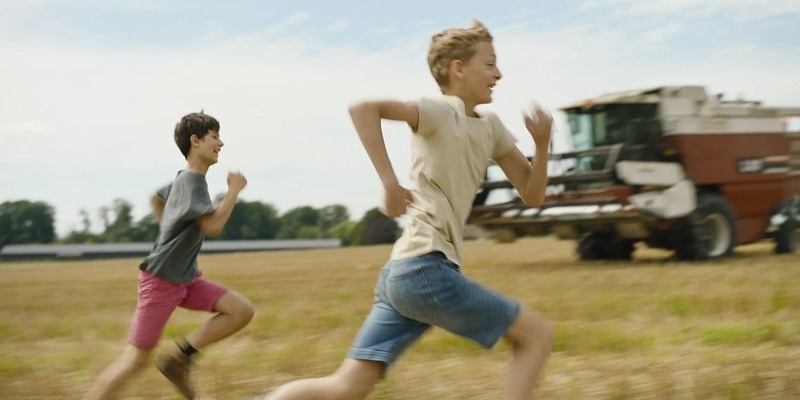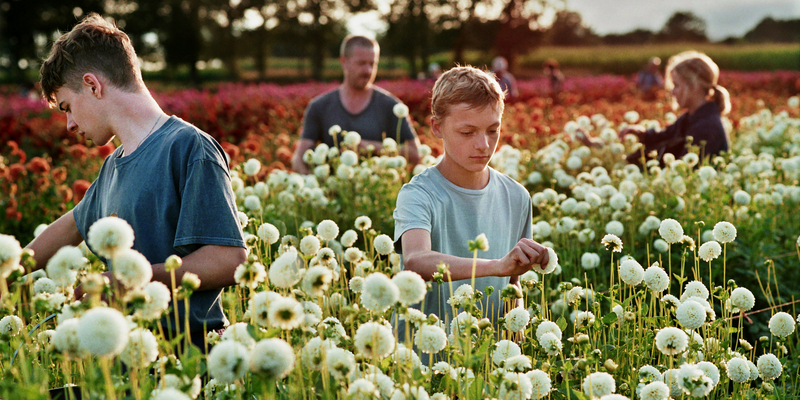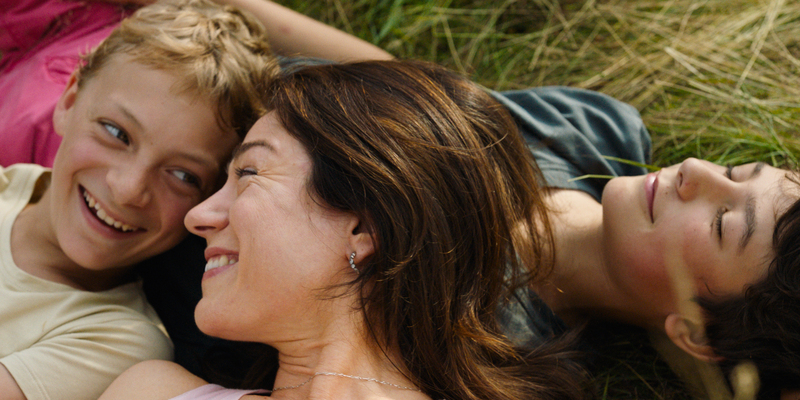
Review by
Eric Hillis
Directed by: Lukas Dhont
Starring: Eden Dambrine, Gustav de Waele, Emilie Dequenne, Léa Drucker, Kevin Janssens

Homophobia is unique among prejudices in that it can be weaponised
against anyone, regardless of their sexuality. You can't hurt a white
person by calling them the n-word, and someone with an athletic physique
is going to laugh off any attempts to call them "fat", but heterosexuals
can be taunted by homophobic slurs, and most have at some point. I'd
like to think things have changed as successive generations have gotten
more open-minded (Close suggests otherwise however), but
when I was a kid any young boy who indulged in an activity that wasn't
associated with an 18th century definition of masculinity immediately
had the f-word hurled at them. Listening to Whitney Houston? "F****t!"
Reading a book? "F****t!" And most ironically of all, hanging out with
girls? "F****t!"
In director Lukas Dhont's Close (co-written with
Angelo Tijssens), two young friends are torn apart by homophobic
taunts, and it's unclear whether either one of them is actually gay.
Maybe they both are. Maybe neither is. Maybe one is and one isn't. It's
irrelevant, as they're damaged by prejudice regardless.

13-year-olds Leo (Eden Dambrine) and Remi (Gustav De Waele) enjoy, as the title suggests, a close friendship. Inseparable during
their summer holidays, they spend every waking minute together, and when
they're not awake they're sleeping in the same bed. So close are the
boys that it's almost as if they each have two sets of parents, as Leo's
mum (Lea Drucker) and dad (Marc Weiss) treat Remi as
though he were their own son, while Remi's parents (Emilie Dequenne, Kevin Janssens) have a similar relationship with Leo.
The boys' innocence is shattered when they enter Belgium's equivalent
of high school. Initially delighted that they've been put together in
the same class, Leo and Remi's closeness is immediately picked up on by
the sort of kids who need someone to target. Between girls asking if
they're a couple, in a manner that suggests not malice but genuine
curiosity, and boys hurling around homophobic slurs, Leo decides if he's
to survive high school he should probably put some distance between
himself and Remi. He joins the hockey team in an attempt to prove his
masculinity, and stops calling over to Remi's house. This deeply hurts
Remi, and with the boys unwilling or unable to discuss the issue, it
leads to the inevitable playground brawl.

This portion of Dhont's film plays in similar fashion to another
similarly themed recent Belgian drama, Laura Wandel's
Playground, in which a young girl distances herself from her older brother upon
realising he's been marked by the school bullies for a campaign of
torment. This is by no means a phenomenon unique to Belgian schools, but
it is interesting how two Belgian filmmakers decided to explore the
concept at the same time (perhaps Belgian readers can tell me if there
was some specific incident of bullying that made the news there in
recent years?).
Close is truly heartbreaking, and there's something about
seeing a platonic friendship end in this way that's far more affecting
than the collapse of a romantic relationship. In their screen debuts,
Dambrine and De Waele prove themselves remarkable young talents. The
latter is asked to evoke our sympathy, which he does in such a
convincing manner that you want to reach into the screen and give him a
reassuring hug and lie to him about how it's going to be okay. Dambrine
has a somewhat more difficult task in provoking both ire and empathy
from the viewer, but he truly sells Leo's mix of guilt and
confusion.

[Spoiler] The marketing has kept a key
plot development secret, so turn away now if you wish to have it sprung
on you as a surprise. Halfway through the movie Leo learns that Remi has
taken his own life. Convinced, rightly or wrongly, that he is to blame,
he spends much of the remainder of the movie wandering in an existential
fugue. He's desperate to confess his perceived sin to Remi's mother, but
can't bring himself to do it. Dequenne delivers such a tender portrayal
of a grieving mother that we can understand his reluctance to add to her
hurt. After all, she's told Leo she thinks of him as a second son –
wouldn't it be cruel to take that away from her? A cliché of European
cinema over the last couple of decades has seen characters attend
classical musical performances and stare into the abyss as sombre music
plays. It pops up once again here in the form of a school recital, but
it has extra weight here as it's a performance at which Remi, a talented
flautist, should have been taking centre stage. As Leo watches the blank
expression of his late friend's emotionally numb mother, our hearts ache
for their respective torment.
I imagine any parents who watch Dhont's devastating drama may start
paying slightly more attention to their own children. Filmmakers can
often over-estimate the importance of their work, but if
Close causes one parent or teacher to step in before
tragedy strikes, it will be the most important movie of the year.


